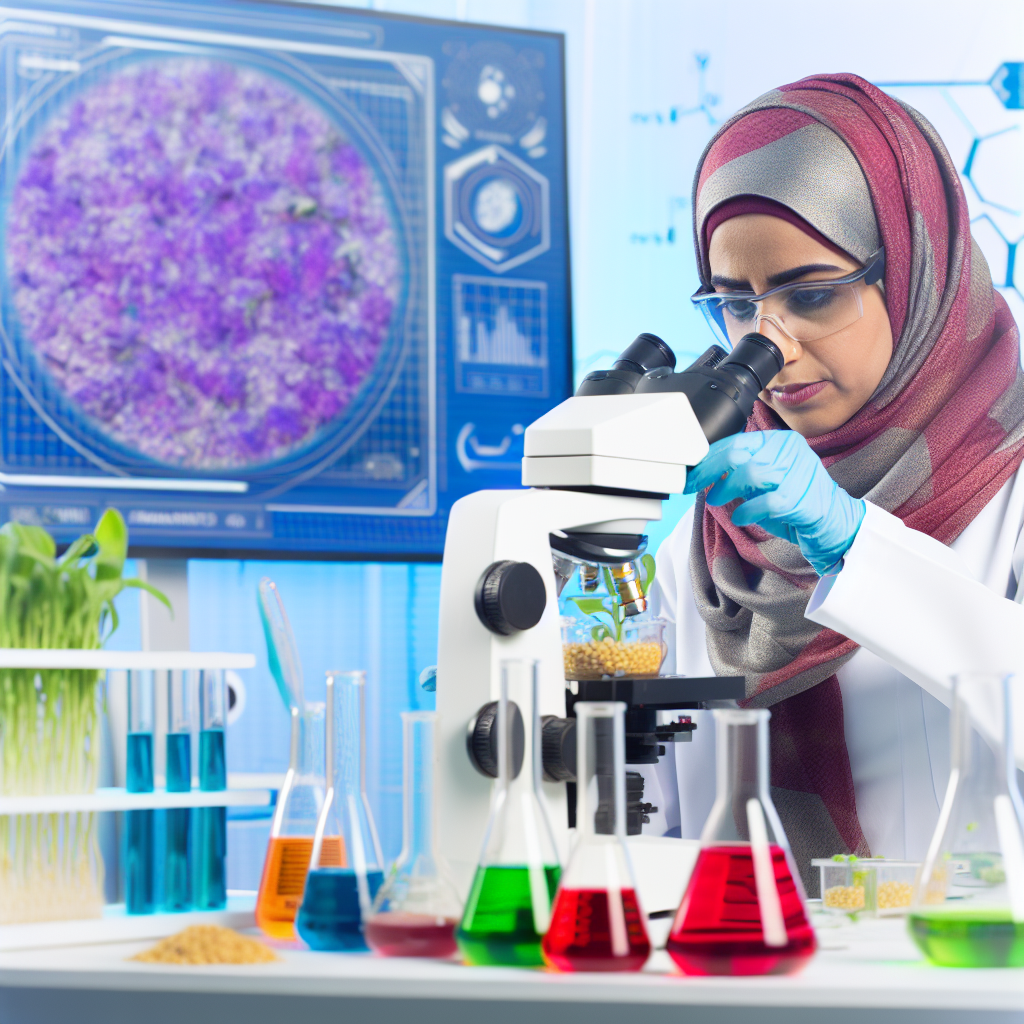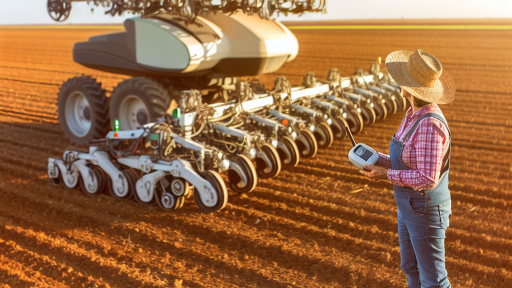Introduction to Biotechnology in Agriculture
Biotechnology plays a crucial role in modern agriculture.
It offers innovative solutions to enhance crop nutritional value.
This technology combines biology and technology for practical applications.
Farmers and scientists collaborate to optimize crop traits.
As a result, crops can be engineered for better nutrients.
Understanding Crop Bioengineering
Crop bioengineering involves altering plant genes.
This process enhances specific traits, such as vitamin content.
Additionally, it can improve resistance to pests and diseases.
Farmers benefit from improved yield and quality.
Case Studies of Enhanced Nutritional Crops
Golden Rice provides vitamin A, combating deficiency worldwide.
This innovation has potential health benefits for millions.
Another example, iron-fortified beans, addresses anemia in populations.
These case studies showcase biotechnology’s impact on nutrition.
The Role of Genomics in Crop Improvement
Genomic research helps identify beneficial genes in plants.
Gene editing techniques further enhance these traits.
Transform Your Agribusiness
Unlock your farm's potential with expert advice tailored to your needs. Get actionable steps that drive real results.
Get StartedConsequently, scientists can create resilient and nutritious varieties.
This approach streamlines traditional breeding methods.
Future Prospects of Biotechnology in Nutrition
The future of agriculture looks promising with biotechnology.
More innovations will likely lead to healthier food options.
Moreover, climate change challenges require these advanced solutions.
Investing in research and development is essential for progress.
Overview of Nutritional Value in Crops
Nutritional value in crops is crucial for human health and well-being.
It encompasses essential vitamins, minerals, and macronutrients.
Healthy crops contribute to balanced diets and improved nutrition.
Biotechnology plays a significant role in enhancing this value.
This section explores how biotechnology boosts the nutritional content of crops.
Importance of Nutritional Value
Nutritional value influences food security globally.
Crops with higher nutritional content combat malnutrition effectively.
Additionally, they support overall health through disease prevention.
Key nutrients like proteins, vitamins, and minerals enhance dietary quality.
Conventional Crop Breeding Limitations
Traditional breeding methods have limitations in nutritional enhancement.
While effective, they often take considerable time to achieve goals.
Also, they may not always address specific nutrient deficiencies.
Consequently, there is a growing need for innovative approaches.
Biotechnology Innovations
Biotechnology offers solutions to enhance crop nutrition efficiently.
For instance, genetic modification can increase vitamin A in rice.
This innovation addresses vitamin A deficiency prevalent in many countries.
Moreover, biotechnology can improve micronutrient concentrations in various crops.
Examples of Enhanced Nutritional Crops
Golden Rice represents a successful biotechnology application.
Showcase Your Farming Business
Publish your professional farming services profile on our blog for a one-time fee of $200 and reach a dedicated audience of farmers and agribusiness owners.
Publish Your ProfileThis rice variant is enriched with beta-carotene, a precursor to vitamin A.
Another example is iron-fortified beans, which combat anemia risk.
These advancements demonstrate the potential of biotechnology to innovate.
Future Perspectives
As global populations grow, nutritional needs will also increase.
Biotechnology can address these needs sustainably and efficiently.
Developing crops with enhanced nutritional profiles will be vital.
Thus, continued investment in biotechnological research is essential.
Mechanisms of Biotechnology: Genetic Modification vs. Traditional Breeding
Understanding the Basics
Biotechnology has transformed agriculture in recent decades.
It enhances the nutritional value of various crops effectively.
Genetic modification and traditional breeding are key methods.
These methods aim to improve crop yields and quality.
Genetic Modification Explained
Genetic modification involves altering an organism’s DNA.
This technique enables scientists to introduce specific traits.
For example, traits may include disease resistance and improved nutrition.
Mechanisms of Genetic Modification
This process uses different methods, such as CRISPR technology.
Scientists can make precise changes to genetic material.
Consequently, crops can possess desired characteristics more rapidly.
Benefits of Genetic Modification
Crops developed through genetic modification can yield greater harvests.
They often have enhanced nutritional profiles, benefiting consumers.
Moreover, these crops may require fewer pesticides and fertilizers.
Traditional Breeding Techniques
Traditional breeding has been used for centuries to improve crops.
This process relies on natural selection and hybridization.
Farmers select plants with desired traits to breed over generations.
Understanding Conventional Breeding
In this method, traits are passed down from parent plants.
It takes time, often requiring several growing seasons.
The result is a gradual enhancement of desirable traits.
Limitations of Traditional Breeding
One major limitation is the time required to achieve results.
Additionally, it often leads to unintended traits in crops.
This process may not always achieve the desired improvements.
Comparative Analysis
Genetic modification allows for rapid trait development.
In contrast, traditional breeding may take much longer.
Both methods provide valuable contributions to agriculture.
However, genetic modification often offers more precision.
Consumer Acceptance and Impact
Consumer acceptance of biotechnology varies widely.
Some people have concerns about genetically modified organisms (GMOs).
Conversely, many support the benefits of enhanced nutrition.
Future Perspectives
The future of crop enhancement lies in biotechnology integration.
This approach promises greater efficiency and sustainability.
Ultimately, both methods will coexist to meet food demands.
See Related Content: Choosing The Right Farm Management Software For Your Farming Needs
Showcase Your Farming Business
Publish your professional farming services profile on our blog for a one-time fee of $200 and reach a dedicated audience of farmers and agribusiness owners.
Publish Your ProfileCase Studies: Successful Biotechnology-Enhanced Nutritional Crops
Golden Rice: A Revolutionary Innovation
Golden Rice has transformed the fight against vitamin A deficiency.
This crop, fortified with beta-carotene, offers a practical solution.
Farmers in Asia now grow Golden Rice widely.
Research indicates it could improve the health of millions.
Moreover, it raises awareness about nutritional deficiencies in crops.
Biofortified Cassava: Addressing Nutritional Challenges
In areas like Africa, biofortified cassava is a game changer.
This variety contains higher levels of vitamins and minerals.
For instance, it enriches diets with essential nutrients.
Farmers appreciate its high yield and resilience to drought.
Consequently, it improves food security and nutritional status.
Iron-Enhanced Beans: A Vital Source of Nutrition
Research led by the International Center for Tropical Agriculture focuses on iron-enhanced beans.
These beans contain significantly more iron than traditional varieties.
This innovation benefits populations with high anemia rates.
Farmers have reported improved health outcomes since its introduction.
Furthermore, the benefits extend to local economies and food systems.
High-Protein Triticale: Combining Wheat and Rye
New triticale varieties offer farmers a protein-rich option.
This hybrid combines the best traits of wheat and rye.
Farmers are planting it for both livestock feed and human consumption.
Studies show it significantly outperforms traditional grains in protein content.
This innovation supports nutritional goals and enhances agricultural resilience.
Vitamin-Enriched Sweet Potatoes: A Nutritional Powerhouse
In regions facing vitamin A deficiencies, sweet potatoes shine.
Recent advancements enhanced their nutritional profile dramatically.
These sweet potatoes are rich in vitamins and micronutrients.
Farmers are increasingly interested in cultivating them.
As a result, community health and nutrition have improved.
Find Out More: Climate Change Mitigation Through Agricultural Biotechnology
The Role of CRISPR Technology in Crop Enhancement
Introduction to CRISPR Technology
CRISPR technology has revolutionized biotechnology.
This powerful tool allows precise editing of DNA.
Furthermore, it enables scientists to enhance crop traits rapidly.
How CRISPR Works
CRISPR acts as a molecular scalpel.
It identifies specific DNA sequences in the genome.
Next, it can cut, remove, or replace targeted genes.
This process improves crop resistance and nutritional value.
Enhancing Nutritional Value
CRISPR allows scientists to boost essential nutrients in crops.
For example, iron and vitamin A levels can be increased.
This technology also aids in reducing harmful compounds.
Consequently, crops become more beneficial for human consumption.
Examples of CRISPR in Action
Researchers at the University of California successfully enhanced tomatoes.
These improved tomatoes contain higher levels of antioxidants.
Additionally, scientists at Cornell University developed rice with increased iron content.
Showcase Your Farming Business
Publish your professional farming services profile on our blog for a one-time fee of $200 and reach a dedicated audience of farmers and agribusiness owners.
Publish Your ProfileThese advancements demonstrate CRISPR’s potential in agriculture.
Future Implications
The future of crop enhancement is promising with CRISPR.
As technology advances, more crops will receive enhancements.
These advancements could lead to global food security.
Moreover, they may help mitigate malnutrition worldwide.
Ethical Considerations
Despite its benefits, CRISPR raises ethical questions.
Many individuals are concerned about genetically modified organisms.
This skepticism necessitates transparent research and discussions.
Overall, balancing innovation and ethics remains crucial.
Learn More: Smart Farming: Leveraging IoT for Sustainable Agriculture

Impact on Food Security and Global Nutrition
Enhancing Crop Nutritional Profiles
Biotechnology plays a crucial role in enhancing the nutritional profiles of crops.
By increasing the levels of vitamins and minerals, these crops offer more health benefits.
For instance, biofortified crops provide essential nutrients often lacking in diets.
This technology helps combat malnutrition, especially in developing countries.
Boosting Food Security
Biotechnology contributes significantly to food security worldwide.
It allows for the development of crops that withstand environmental stresses.
Drought-resistant plants offer reliable yields even during challenging conditions.
This reliability reduces food shortages and stabilizes prices for consumers.
Supporting Agricultural Sustainability
Innovative biotechnological methods promote sustainable farming practices.
These methods reduce the need for chemical fertilizers and pesticides.
By lowering input costs, farmers can increase their profit margins.
Ultimately, this leads to healthier ecosystems and more sustainable agriculture.
Case Studies of Biotechnology Success
Case studies illustrate the benefits of biotechnology in agriculture.
In India, the introduction of BT cotton led to higher yields and profits.
This success story highlights the potential of biotechnology to transform lives.
Moreover, projects in Africa focus on biofortified crops addressing malnutrition.
Collaboration and Global Initiatives
Collaboration among researchers, governments, and organizations drives success in biotechnology.
Global initiatives support the development and distribution of improved crop varieties.
These efforts aim to ensure that all populations have access to nutritious food.
Joint ventures also foster knowledge sharing and technological advancements worldwide.
Learn More: How Blockchain Enhances Traceability In Agricultural Supply Chains
Consumer Perspectives and Acceptance of Biotech Foods
Understanding Consumer Attitudes
Consumers often hold mixed views on biotechnology in food production.
Some people embrace biotech foods enthusiastically.
Others express skepticism about their safety and effectiveness.
Understanding these attitudes is crucial for market acceptance.
Factors Influencing Acceptance
Several factors influence consumer acceptance of biotech foods.
- Education plays a key role in shaping perceptions.
- Trust in food producers significantly affects opinions.
- Previous experiences with food technology influence decisions.
- Media coverage can sway public opinion on biotechnology.
The Role of Education
Education is essential for informing consumers about biotech foods.
Informed consumers tend to be more supportive of biotechnology.
Schools and universities should include biotechnology in their curricula.
Public outreach and educational campaigns are equally important.
Showcase Your Farming Business
Publish your professional farming services profile on our blog for a one-time fee of $200 and reach a dedicated audience of farmers and agribusiness owners.
Publish Your ProfileTrust in Food Producers
Trust can significantly enhance acceptance of biotech foods.
Consumers prefer transparency from food producers regarding biotechnology.
Companies must communicate clearly about their processes and products.
A positive reputation can foster trust in biotech innovations.
Previous Experiences and Consumer Behavior
Previous experiences with food technology can shape individual opinions.
Positive past experiences can lead to greater acceptance.
Conversely, negative experiences can instill lasting skepticism.
It is vital for producers to address concerns stemming from past incidents.
Impact of Media on Public Perception
Media plays a powerful role in shaping consumer attitudes.
Positive media coverage can boost acceptance of biotech foods.
Conversely, sensationalized reports can create fear and doubt.
Producers must proactively engage with media to promote accurate information.
Global Perspectives on Biotech Foods
Greater acceptance of biotech foods is seen in various regions.
For instance, countries in Africa often recognize its potential.
In contrast, European nations remain more hesitant toward biotech foods.
Understanding these global perspectives can inform localized strategies.
Regulatory and Safety Considerations in Biotech Crop Development
Importance of Regulatory Frameworks
Regulatory frameworks ensure the safe development of biotech crops.
They provide guidelines that protect public health and the environment.
These frameworks vary widely between countries and regions.
Some nations require extensive testing before approval.
Others adopt a more relaxed approach.
Key Regulatory Agencies
Several key agencies oversee biotech crop regulation worldwide.
In the United States, the USDA, EPA, and FDA have distinct roles.
The USDA focuses on plant health and agronomic assessments.
The EPA evaluates environmental impacts and pesticide regulations.
The FDA ensures the safety of food products derived from biotech crops.
Risk Assessment Protocols
Risk assessment protocols are crucial in biotech crop development.
They evaluate potential health and environmental risks.
These assessments consider factors like allergenicity and gene transfer.
Data from field trials and laboratory tests support these evaluations.
Additionally, transparent communication of findings is essential.
Public Engagement and Transparency
Public engagement is vital in the biotech crop approval process.
Stakeholders include farmers, consumers, and advocacy groups.
Open dialogues build trust and address concerns effectively.
Transparency about research findings fosters informed decisions.
Moreover, regulatory bodies often hold public consultations.
Global Considerations
Global trade impacts regulatory considerations in biotech crops.
Countries with strict regulations may face trade barriers.
Conversely, countries with lenient regulations might benefit economically.
Harmonizing regulations can promote global acceptance of biotech crops.
Showcase Your Farming Business
Publish your professional farming services profile on our blog for a one-time fee of $200 and reach a dedicated audience of farmers and agribusiness owners.
Publish Your ProfileThis can ultimately enhance food security across nations.
Additional Resources
Bold Goals for U.S. Biotechnology and Biomanufacturing …
Expanded Intellectual Property Protections for Crop Seeds Increase …




